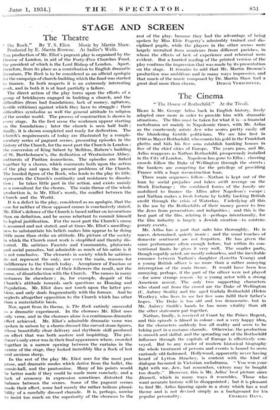STAGE AND SCREEN The Theatre
The Rock." By T. S. Eliot. Music by Martin Shaw. Produced by E. Martin Browne. At Sadler's Wells.
TUE production of Mr. Eliot's pageant play is organized by the Diocese of London, in aid of the Forty-Five Churches Fund, the president of which is the Lord Bishop of London. Apart, therefore, from its place as a contribution to English dramatic literature, The Rock is to be considered as an official apologia for the campaign of church-building which the fund was started to finance. In both respects it is an extremely interesting work, and in both it is at least partially a failure.
The direct action of the play turns upon the efforts of a group of bricklayers engaged in building a church, and the difficulties (from bad foundations, lack of money, agitators, hostile criticism) against which they have to struggle : their difficulties symbolize as well the general attitude to religion of the secular world. The process of construction is shown in every stage. In the first scene the workmen appear starting on the foundations ; later the church is seen half built ; finally, it is shown completed and ready for dedication. The Church's requirements of today are illustrated by a comple- mentary series of pageant scenes, presenting episodes in the history of the Church, for the most part the Church in London : the conversion of King Sabert by Mellitus, Rahere's building of St. BartholomeW's, the dedieation of Westminster Abbey. outbursts of Puritan iconoclasm. The episodes are linked together by a chorus, which comments both upon the action of the play and upon the present problems of the Church. The hooded figure of the Rock, who lends to the play its title, represents the Church's continuity and resistance to dissolu- tion ; he takes little part in the action, and exists mainly as a consultant for the chorus. The main, theme of the whole production is, in Mr. Eliot's words, the conflict between the Church and the World.
It is a defect in the play, considered as an apologia, that the ease for neither of these opposed causes is conclusively stated. Mr. Eliot's defence of the Church is based rather on invocations than on definition, and he seems reluctant to commit himself to logical justification. For the most part the Church's cause is assumed and not stated, and at times Mr. Eliot's unwilling- ness to substantiate his beliefs makes him appear to be doing little more than strike an attitude. His picture of the society in which the Church must work is simplified and thereby dis- torted. He satirizes Fascists and Communists, plutocrats and social parasites, but admirable as much of his satire is it is not conclusive. The elements in society which he satirizes do not represent the only, nor even the main, reasons for indifference to the Church today. Acceptance of Fascism or Communism is for many of their followers the result, not the cause, of dissatisfaction with the Church. The causes in many instances lie elsewhere ; in, for example, despair of the Church's attitude towards such questions as Housing and Population. Mr. Eliot does not touch upon the latter pro- blem, and only deals fragmentarily with the former. And he neglects altogether opposition to the Church which has other than a materialistic basis.
Nor, apart from its theme, is The Rock entirely successful as a dramatic experiment. In the choruses Mr. Eliot uses only -Verse, and in the choruses alone is a continuous dramatic effect achieved. Mr. Eliot's admirable dramatic verse was spoken in unison by a chorus dressed like carved stone figures, whose beautifully clear delivery and rhythmic skill produced an effect that was both austere and inspiriting. The pro- ducer's only error was in their final appearance where, crowded together in a narrow opening between the curtains in the centre of the stage, they looked incredibly like a flock of lost and anxious sheep.
In the rest of the play Mr. Eliot uses for the most part prose, and dramatic modes which derive from the ballet, the music-hall, and the pantomime. Many of his points would be better made if they could be made more concisely, and a lack of economy in expression sometimes distorted the balance between the scenes. Some of the pageant scenes made their effect, some had merely the rather tedious plausi- bility of a carefully dressed charade. It is, perhaps, unwise to insist too much on the superiority of the-choruses to the
rest of the play, because they had the advantage of being spoken by Miss Elsie Fogerty's admirably trained and dis- ciplined pupils, while the players in the other scenes were largely recruited from amateurs from different parishes, in whom the effects of lack of experience -and rehearsal were evident. But a hurried reading of the printed version of the play confirms the impression that was made by its presentation on the stage. It remains to add that Mr. Martin Browne's production was ambitious and in many ways impressive, and that much of the music composed by Dr. Martin Shaw had a




































 Previous page
Previous page